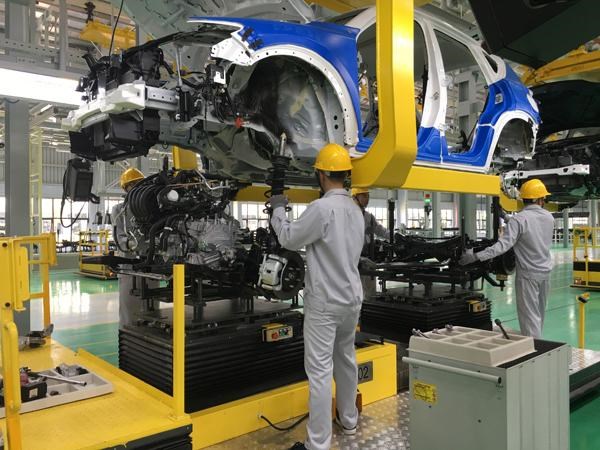Auto firms urged to have suitable business plans amid COVID-19
Automobile producers are observing the complex changes of the second wave of the COVID-19 pandemic to adjust their businesses.
 An auto assembly line at a plant of Truong Hai Auto Corporation (THACO) in central province of Quang Nam. (Photo quangnam.tintuc.vn)
An auto assembly line at a plant of Truong Hai Auto Corporation (THACO) in central province of Quang Nam. (Photo quangnam.tintuc.vn)Hanoi (VNS/VNA) - Automobile producers are observing the complex changes of
the second wave of the COVID-19 pandemic to adjust their businesses.
After the first half of the year facing sluggishness and stagnancy in production and business, domestic automobile manufacturers and assemblers were pleased the Government cut vehicle registration fees by 50 percent and is preparing to extend the deadline for paying special consumption tax.
After the first half of the year facing sluggishness and stagnancy in production and business, domestic automobile manufacturers and assemblers were pleased the Government cut vehicle registration fees by 50 percent and is preparing to extend the deadline for paying special consumption tax.
However, with the new COVID-19
outbreak, automobile firms are expected to face new difficulties.
After the end of social distancing in April, most auto agents and businesses resumed operations. However, according to a survey conducted by the Ministry of Industry and Trade (MoIT), auto production and assembly capacity stayed at a very low level due to high inventory of up to 122.5 percent. The main reason was automobile consumption is facing many difficulties due to the sharp decline in domestic purchasing power.
Nguyen Trung Hieu, head of the Policy Department at the Vietnam Automobile Manufacturers Association (VAMA), told Tien Phong (Vanguard) newspaper that COVID-19 had caused complicated changes, requiring auto producers to devise suitable plans.
Hieu said auto businesses in Da Nang and Quang Nam were affected first such as Truong Hai Auto Corporation (THACO) and Tan Chong Motor. THACO contributes up to 55 percent of State budget contributions for Quang Nam province. It was the reason the provincial People’s Committee said the province would not be able to contribute to the State budget this year.
Ford Vietnam was one of the firms most affected by the first wave of COVID-19 in the auto industry. Its plant in northern Hai Duong province was invested 82 million USD for expansion at the beginning of this year and was expected to be complete in the middle of 2022. Due to the pandemic, since March 27, production activities had to be halted for social distancing. Many foreign experts have yet to come to Vietnam to work for the firm. After the pandemic subsided, the factory was back in operation in mid-July.
However, according to Ford's regulations in the US that apply globally, most office workers in Vietnam are working from home. The production, sales and service departments are still operating and must fully apply COVID-19 prevention regulations, ensuring safety for everyone.
Talking about the decision to reduce registration fees by half, a Ford representative said all the Government's support solutions are very precious to businesses. However, due to the global influence of the pandemic, the source of imported raw materials for production was interrupted while shopping demand had dropped sharply due to cautious sentiment.
Previously, Ford Vietnam also planned to assemble the Escape model after five years of absence from the market. However, the supply of raw materials has been difficult to import. This model may not be released in time this year to take advantages of the registration incentives.
According to a representative of Honda Vietnam, the COVID-19 pandemic has made the firm's business results in the financial year 2020 reduce by 8 percent from the same period last year.
However, due to the Government's support policies, on July 20, Honda Vietnam returned to assembly and released the CR-V 2020 model after about three years importing from Thailand for distribution.
Similarly, Mitsubishi Vietnam has returned to assemble at the factory in Binh Duong province and launched its best-selling model, the Xpander, after nearly two years of importing from Indonesia.
The moves showed auto firms have been expanding their production in the country while offering different types of vehicles. Moreover, local assembly would help customers save a lot of money from the policy of 50 percent reduction in registration fees.
Le Dang Doanh, former director of the Central Institute for Economic Management (CIEM), forecast that with the complex changes of COVID-19, sectors producing unnecessary goods would face difficulties.
People would be cautious, leading to a decline in some items such as clothing, furniture, cars and electronic equipment. The real estate market would also be affected, he said.
VAMA agreed, saying the automotive market would have negative growth of at least 15 percent in 2020. If the pandemic continues, car production and sales in Vietnam may hit the lowest level in the past 10 years.
The MoIT proposed approving the Government’s resolution on solutions for the development of the support industry soon. Regulations on special consumption tax for locally produced auto could be revised to provide preferential treatment for high localisation rate. Meanwhile, the value-added tax may be refunded soon to help businesses accumulate more capital.
Statistics from VAMA showed that in May, the auto market recorded an increase of 62 percent in sales compared to April. In June, the total sales of VAMA’s members reached 24,002 vehicles, up 26 percent compared to May. In July when the Government's decision to slash registration fees in half started to take effect, auto sales improved slightly./.
After the end of social distancing in April, most auto agents and businesses resumed operations. However, according to a survey conducted by the Ministry of Industry and Trade (MoIT), auto production and assembly capacity stayed at a very low level due to high inventory of up to 122.5 percent. The main reason was automobile consumption is facing many difficulties due to the sharp decline in domestic purchasing power.
Nguyen Trung Hieu, head of the Policy Department at the Vietnam Automobile Manufacturers Association (VAMA), told Tien Phong (Vanguard) newspaper that COVID-19 had caused complicated changes, requiring auto producers to devise suitable plans.
Hieu said auto businesses in Da Nang and Quang Nam were affected first such as Truong Hai Auto Corporation (THACO) and Tan Chong Motor. THACO contributes up to 55 percent of State budget contributions for Quang Nam province. It was the reason the provincial People’s Committee said the province would not be able to contribute to the State budget this year.
Ford Vietnam was one of the firms most affected by the first wave of COVID-19 in the auto industry. Its plant in northern Hai Duong province was invested 82 million USD for expansion at the beginning of this year and was expected to be complete in the middle of 2022. Due to the pandemic, since March 27, production activities had to be halted for social distancing. Many foreign experts have yet to come to Vietnam to work for the firm. After the pandemic subsided, the factory was back in operation in mid-July.
However, according to Ford's regulations in the US that apply globally, most office workers in Vietnam are working from home. The production, sales and service departments are still operating and must fully apply COVID-19 prevention regulations, ensuring safety for everyone.
Talking about the decision to reduce registration fees by half, a Ford representative said all the Government's support solutions are very precious to businesses. However, due to the global influence of the pandemic, the source of imported raw materials for production was interrupted while shopping demand had dropped sharply due to cautious sentiment.
Previously, Ford Vietnam also planned to assemble the Escape model after five years of absence from the market. However, the supply of raw materials has been difficult to import. This model may not be released in time this year to take advantages of the registration incentives.
According to a representative of Honda Vietnam, the COVID-19 pandemic has made the firm's business results in the financial year 2020 reduce by 8 percent from the same period last year.
However, due to the Government's support policies, on July 20, Honda Vietnam returned to assembly and released the CR-V 2020 model after about three years importing from Thailand for distribution.
Similarly, Mitsubishi Vietnam has returned to assemble at the factory in Binh Duong province and launched its best-selling model, the Xpander, after nearly two years of importing from Indonesia.
The moves showed auto firms have been expanding their production in the country while offering different types of vehicles. Moreover, local assembly would help customers save a lot of money from the policy of 50 percent reduction in registration fees.
Le Dang Doanh, former director of the Central Institute for Economic Management (CIEM), forecast that with the complex changes of COVID-19, sectors producing unnecessary goods would face difficulties.
People would be cautious, leading to a decline in some items such as clothing, furniture, cars and electronic equipment. The real estate market would also be affected, he said.
VAMA agreed, saying the automotive market would have negative growth of at least 15 percent in 2020. If the pandemic continues, car production and sales in Vietnam may hit the lowest level in the past 10 years.
The MoIT proposed approving the Government’s resolution on solutions for the development of the support industry soon. Regulations on special consumption tax for locally produced auto could be revised to provide preferential treatment for high localisation rate. Meanwhile, the value-added tax may be refunded soon to help businesses accumulate more capital.
Statistics from VAMA showed that in May, the auto market recorded an increase of 62 percent in sales compared to April. In June, the total sales of VAMA’s members reached 24,002 vehicles, up 26 percent compared to May. In July when the Government's decision to slash registration fees in half started to take effect, auto sales improved slightly./.













